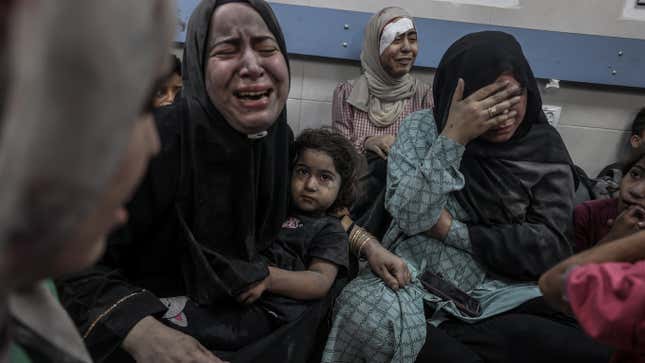Pregnant Women in Gaza Are Undergoing C-Sections Without Anesthesia as Humanitarian Crisis Worsens
CARE International “now has confirmation" that the lack of anesthesia from Israel’s blockade is subjecting pregnant women to the unthinkable.
Entertainment

In southern Gaza, a woman named Raneem Hejazi was 32 weeks pregnant when she was nearly killed by an Israeli airstrike on October 25, NPR reported last week. Shortly after being rescued from under the rubble, doctors at Nasser Hospital performed an emergency C-section guided by cell phone flashlights in order to save her unborn child. Dr. Mohammad Qandeel, who performed the procedure, didn’t have clean water to wash his hands nor antibiotics to prevent infections. The baby was safely delivered and named after a family member who had been killed by a recent Israeli airstrike.
Hejazi, whose arm was crushed—and later amputated—and whose legs were broken by the attack, was just one of two emergency C-sections that Nasser Hospital performed on that day alone. At a different hospital in Gaza, another baby was delivered at 32 weeks via C-section from a dying pregnant woman who had been hit by an Israeli airstrike. The baby, the Gaza director of Medical Aid for Palestinians (MAP) told Jezebel last week, is the last surviving member of his entire family.
According to the international humanitarian organization CARE, these emergency C-sections are increasingly being performed without anesthetics amid the collapse of the Gazan health system, under both bombardment and an ongoing blockade preventing medical supplies, food, water, and fuel from entering. CARE International shared with Jezebel on Wednesday that the organization “now has confirmation” from medical personnel across Gaza that more and more pregnant Gazan women are undergoing C-sections sans anesthetic.
-

-

-

-

-

-

-

-

-

-

-

-

-

-

-

-

-

-

-

-

-

-

-

-

-

-

-

-

-

-

-

-

-

-

-

-

-

-

-

-








































